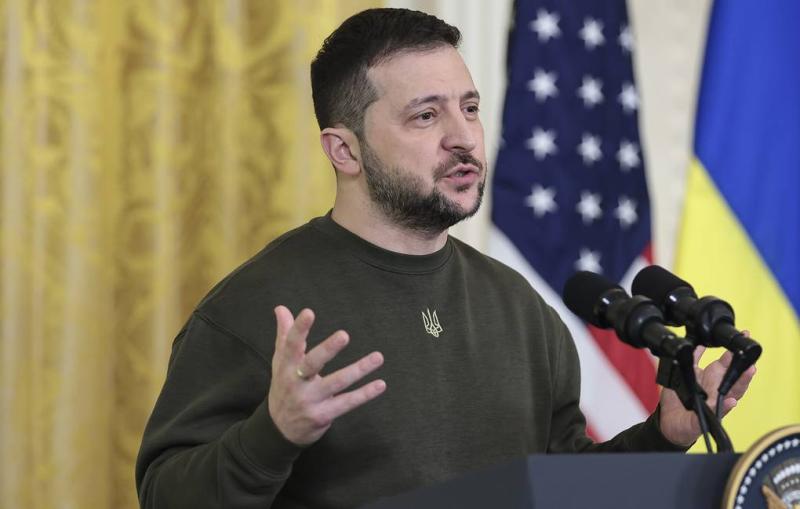
© Oliver Contreras/Sipa USA via Reuters Connect/TASS
Top stories from the Russian press on Friday, December 23rd, prepared by TASS
Washington will help Ukraine prepare for a new round of fighting, Russia may need large oil storage facilities, and the most radical cabinet in Israeli history may affect the country's foreign policy. These stories topped Friday’s newspaper headlines across Russia.
Nezavisimaya Gazeta: US to help Ukraine prepare for new stage of fighting against Russia
Ukrainian President Vladimir Zelensky’s visit to Washington showed that the Biden administration is set to support Kiev for an offensive that could be launched in the next few months. US National Security Council Coordinator for Strategic Communications John Kirby said the winter will mark a new stage in the Ukraine-Russia hostilities, while Zelensky told the Congress that next year would be a ‘turning point’ in the conflict. In response, US President Joe Biden vowed to continue supporting Ukraine and announced that Washington would send $1.85 billion in additional aid.
Among other things, the Pentagon will sponsor the delivery of 100,000 125 mm rounds of tank ammunition to Ukraine, and this is what concerns military expert Yury Netkachev the most. In an interview with Nezavisimaya Gazeta, the retired lieutenant-general said the amount outlined by Washington would suffice to equip several mechanized brigades for at least a six-month period.
The expert said, citing data from the Russian Defense Ministry, that before Moscow’s special military operation, there were about 2,400 tanks and other armored vehicles in service with the Ukrainian forces, and the bulk of those, or about 1,500 units, were destroyed within a month. However, NATO and the US largely replenished that. In his meeting with Zelensky, Biden said that more than 50 countries had sent Ukraine some 2,000 tanks and other armored vehicles, more than 800 artillery systems and over 2 million artillery shells. Russia has not destroyed all of Ukraine’s fighting potential, and Kiev is arming and amassing reserves to attack the Russian army’s positions with support and military assistance from the Pentagon and NATO, Netkachev said.
Another military expert, retired Colonel Nikolay Shulgin urged the Russian military command to show utmost vigilance, since, apart from the $1.85 billion aid, further military assistance for Ukraine’s next rounds of fighting against Russia is in the making. The Congress should soon approve an extra $44.9 billion of aid to Ukraine, of which $13.37 billion will be spent to support Ukraine’s economy and budget. The rest of the sum will buy Kiev weapons, ammunition and military hardware under lend-lease, and the Ukrainian armed forces could also receive US-made jets and tanks, Shulgin warned.
Rossiyskaya Gazeta: Does Russia need to build large oil storage facilities?
The US Treasury has made clarifications on another export price ceiling, this time on Russian petroleum products, though the price ceiling has yet to be fixed. The EU’s ban on Russian fuel imports will come into effect on February 6. However, Washington has already announced that the price cap for Russian petroleum products would go into effect on April 1, 2023.
The European Union warned it would introduce its ban back in May, and by December 6, Russia redirected as much crude oil exports from the west to the east and Turkey as it could. It will have more difficulty reorienting its petroleum products, with 1.5 months to go before the embargo. The main problem lies with diesel fuel, half of which used to be exported to Europe. Producing some amounts of it for rainy days will be impossible, therefore Russia will have to lower oil refining and production volumes.
To counterbalance these negative scenarios, during the 2020 pandemic and this spring, the Energy Ministry considered building large oil storage facilities in Russia, like the ones the US has for its strategic crude reserves. In 2010, the US had 726 million barrels of oil (equivalent to some 100 million metric tons), or a record maximum, in them. This equals the annual volume of a potential decline in Russian oil production in an IEA forecast.
Russia needs strategic oil storage to support its oil industry and oil traders to make up for the changes in export demand and supply in the mid-term, Alexander Potavin, an analyst at Finam, told Rossiyskaya Gazeta. Judging from global experience, this necessitates building oil storage tanks that can hold some 50 to 100 million metric tons of crude and similar amounts of petroleum products. And a state-backed operator should manage the reserves, the expert noted.
Director of the National Energy Security Fund Konstantin Simonov argues that Russia should make shipbuilding a priority. For example, supertankers that can carry more than 2 million barrels of oil could be used for oil storage, he said. As for surface and underground storage, oil importing countries rather than oil exporters should have those.
The Energy Ministry did not respond to the newspaper’s latest request, but it is known that it will take the country three to five years to build oil storage facilities on depleted oil fields.
Izvestia: How Netanyahu’s new Cabinet will affect Israel’s foreign policy
On Wednesday night, Benjamin Netanyahu assembled a new government a few minutes before the deadline, and the main intrigue now is who will get ministerial posts, with Netanyahu’s right-wing and orthodox allies vying for the positions of defense and interior ministers.
Outgoing Prime Minister Yair Lapid warned that the country’s next government would be the most extreme in Israeli history. This is mostly because far-right politicians Itamar Ben-Gvir and Bezalel Smotrich will join the Cabinet. According to the Haaretz, Ben-Gvir who supports the Kahane movement outlawed in the United States and deemed to be a terrorist group in the EU, may become national security minister who will control the Israel Border Police in the West Bank. As for Smotrich, he used to promote the idea of separating Jews and Arabs at Israeli maternity hospitals and could get the post of either finance or defense minister.
Israeli political analyst Vladimir Khanin told Izvestia that who exactly will be in the Cabinet and the names of individual ministers would be known closer to Netanyahu’s swearing-in ceremony, so, he said, it is too early to claim that Ben-Gvir will be the country’s security minister or that Smotrich will become the country’s defense chief.
As for the stability of the coalition, Netanyahu’s right-wing Cabinet could rule longer than the outgoing government which had left-wing parties and Arabs as its members, Sergey Melkonyan from the Department of Israeli Studies at the Russian Academy of Sciences’ Institute of Oriental Studies told Izvestia. At the same time, the political certainty of the coalition could stir unrest in society, he warned, and Netanyahu’s priority would be to prevent an escalation of internal strife, rather than preserving his power or keeping the coalition. According to Melkonyan, the Israeli PM could also face problems with the US and other Western nations because of his far-right Cabinet. The West finds Ben-Gvir’s ideology unacceptable, and the Biden administration has already hinted it will hardly cooperate with either Ben-Gvir, or Smotrich, or other far-right politicians.
There are also fears that right-wing radicals in the Cabinet would aggravate Israel’s relations with the Arab world. As for relations with Russia, Israel will most likely be more pro-American, Omar Rahman from the Middle East Council on Global Affairs told Izvestia.
According to him, the United States has been putting pressure on Israel for months so that the country "relinquish its neutrality and join the Western sanctions against Russia." And yet, in October, Israeli Defense Minister Benny Gantz refused to send weapons to Kiev.
Nezavisimaya Gazeta: Sweden seeks joining NATO, yet reluctant to make concessions to Erdogan
Swedish Foreign Minister Tobias Billstrom has met with his Turkish counterpart Mevlut Cavusoglu in Ankara. The two diplomats discussed the entry of Sweden and Finland to NATO. Turkey and Hungary are the only two members of the alliance who have yet to ratify the membership of the two Nordic countries. And Ankara is unsatisfied with the way Stockholm has been meeting Turkey’s conditions for this ratification.
Associate Professor of the Department of Integration Processes at MGIMO Alexander Tevdoy-Burmuli can see no insurmountable obstacles to Sweden and Finland joining NATO.
The two nations can somehow reach an agreement with Turkey, and Billstrom’s visit itself means there is a path toward this goal, otherwise Sweden’s top diplomat wouldn’t have come, the expert argues.
Tevdoy-Burmuli told Nezavisimaya Gazeta that the entire bloc is interested in the membership of Sweden and Finland, and it’s not even the strategic geographical position of the two countries that matters. Their armies will be easily integrated into NATO’s military structure, and the two nations, who are part of the West, have already been promised military assistance in the event of any problems with Russia, which means that the two have already been recognized as peers. Moreover, on December 20, Sweden decided to give EU and NATO military units access to its territory and will allow Switzerland to do so from January 1 to December 31, 2023.
Whether there will be a nuclear umbrella for Sweden and Finland is a separate issue for the expert. Anyway, both Stockholm and Helsinki will be guaranteed the alliance’s full protection, he said. Currently, NATO soldiers can be deployed to both Sweden and Finland without the fifth paragraph of NATO’s Charter on collective defense, so Recep Tayyip Erdogan’s consent to the entry of the two is not a matter of life and death for them. Finally, Erdogan has yet to be reelected president next year, and if he fails to do so, Turkey’s claims against Sweden may be dropped. Therefore, the Swedes will not be obediently doing everything the Turkish leader wants them to, Tevdoy-Burmuli concluded.
Vedomosti: Russia delays construction of more checkpoints on border with China
According to a letter the Russian Transport Ministry sent to the Industry and Trade Ministry in late November, the timeframes for upgrading and building 10 checkpoints on the border with China will be delayed for at least a year. And the majority of border crossings will be put into operation in the next three to four years. According to the Transport Ministry, three international motor road checkpoints are being built already, and another five of these and two railway ones are being modernized. The letter reads that the reconstruction of the bulk of all checkpoints is scheduled for 2024-2026.
Currently, there are 10 automobile and four railway checkpoints on the border between Russia and China. Their daily capacity is reduced to 50 trucks and 30 trains. A Russian Railways official told Vedomosti that the rail giant is ready to carry out the transportation of 48 trains per day, a level previously coordinated with China. The restrictions on the number of trains are related to China’s anti-coronavirus measures.
Oksana Feoktistova, CEO of PEK:Global, said if the capacity of the existing checkpoints remains the same next year, the number of stuck cargoes may increase, while companies and consumers will have to shoulder additional costs.
And market players believe delivery times will keep growing even if China abolished its anti-coronavirus restrictions because of Russia’s reorientation of its cargoes to the East. Expert Dmitry Baranov says the Industry and Trade Ministry could diversify Russian cargo flows by sending those to CIS countries or using the Northern Sea Route.









